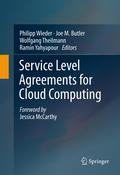
Service level agreements for cloud computing
Wieder, Philipp
Butler, Joe M.
Theilmann, Wolfgang
Yahyapour, Ramin
Service Level Agreements for Cloud Computing provides a unique combination ofbusiness-driven application scenarios and advanced research in the area of service-level agreements for Clouds and service-oriented infrastructures. Current state-of-the-art research findings are presented in this book, as well as business-ready solutions applicable to Cloud infrastructures or ERP (Enterprise Resource Planning) environments. Service Level Agreements for Cloud Computing contributes to the various levels of service-level management from the infrastructure over the software to the business layer, including horizontal aspects like service monitoring. This book provides readers with essential informationon how to deploy and manage Cloud infrastructures. Case studies are presentedat the end of most chapters. Service Level Agreements for Cloud Computing is designed as a reference book for high-end practitioners working in cloud computing, distributed systems and IT services. Advanced-level students focused on computer science will also find this book valuable as a secondary text book orreference. INDICE: Part I Introduction to Service Level Agreements in Service Oriented Architectures. Motivation and Overview. A Reference Architecture for Multi-Level SLA Management. The Open Reference Case. Part II Foundations for Service Level Agreements. The SLA Model. Service Construction Meta-Model. Translation of SLAs into Monitoring Specifications. Part III Scientific Innovations. Penalty Management in the SLA SOI Project. Dynamic Creation of Monitoring Infrastructures. Runtime Prediction. Software Performance and Reliability Prediction. Part IV Core Components of the Service Level Agreements Framework. G-SLAM - TheAnatomy of the Generic SLA Manager. A Generic Platform for Conducting SLA Negotiations. Part V Management of the Business Layer. Management of the BusinessSLAs for Services eContracting. Part VI Management of the Software Layer. Model-Driven Framework for Business Continuity Management. Managing Composite Services. Part VII Management of the Infrastructure Layer. SLA-Enabled Infrastructure Management. Part VIII Selected Business Use Cases. Introduction to the SLA@SOI Industrial Use Cases. The ERP Hosting Use Case Scenario. The Enterprise IT Use Case Scenario. The Service Aggregator Use Case Scenario. The eGovernment Use Case Scenario.
- ISBN: 978-1-4614-1613-5
- Editorial: Springer New York
- Encuadernacion: Cartoné
- Páginas: 358
- Fecha Publicación: 28/12/2011
- Nº Volúmenes: 1
- Idioma: Inglés
